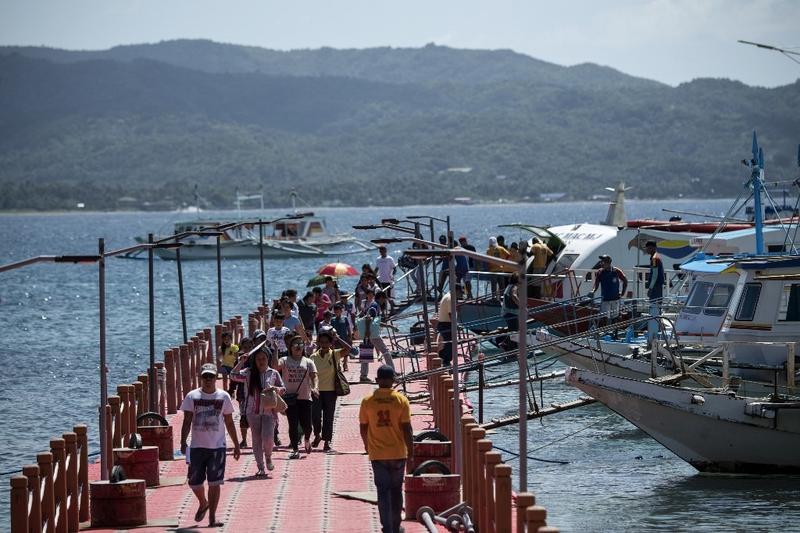 Local tourists and residents arrive at the jetty port on the Philippine island of Boracay on Oct 25, 2018. (PHOTO /AFP)
Local tourists and residents arrive at the jetty port on the Philippine island of Boracay on Oct 25, 2018. (PHOTO /AFP)
The woman in charge of luring investors to Philippine economic zones wants to build “green” towns in industrial parks and convert military reserves into defense-manufacturing hubs.
Charito Plaza, who leads the agency overseeing more than 400 economic zones around the Southeast Asian archipelago, is seeking partnerships with property developers to convert undeveloped land in state-run industrial parks into retail and residential areas.
“Economic zones will be targeted to become smart townships, where investors and workers will work, live, learn and play,” she said in a virtual interview Thursday. “I’m promoting environmentally friendly economic zones.”
Development could be through a joint venture or long-term lease, the economic zone chief said, adding that the agency is building infrastructure in these areas to attract partners.
President Rodrigo Duterte sees economic zones as key to boosting investment in the Philippines and creating jobs, particularly in less developed areas outside the capital
ALSO READ: Philippines' Duterte looking to reopen economy in weeks
Defense Hub
President Rodrigo Duterte sees economic zones as key to boosting investment in the Philippines and creating jobs, particularly in less developed areas outside the capital. Since taking office in 2016 he has approved 73 economic zones -- about 80% of them information-technology hubs -- while 10 are industrial parks.
The agency also wants to turn some military reserves into specialized economic zones for making defense machinery and software.
Plaza said defense companies from Korea, Israel, China and Russia have expressed interest in setting up shop in the Philippines. The agency aims to get Duterte’s approval to convert as many as eight reserve areas into defense hubs before he steps down in 2022, she said.
Among areas under consideration are Camp Evangelista on Mindanao island and parts of Fort Bonifacio in Manila. The plan is purely for commercial defense purposes, not to turn these into foreign military bases, Plaza said.
READ MORE: Overdue election changes ensure Asian prosperity
COVID-19 Precautions
Amid the pandemic, strict health protocols have been enforced in economic zones, including routine disinfection of factories and provision of lodging for workers.
Plaza helped companies in industrial parks win government approval for tax deductions for the cost of COVID-19 mitigation. As a result, 90 percent of nearly 4,600 companies in economic zones around the country continued operating during the pandemic, with more than 1.5 million of a total 1.6 million jobs retained.
“We were able to do a tough balancing act,” said Plaza, who returned to her office last week after a three-week battle with COVID-19.
The agency continues to hold investor briefings -- now virtually -- to lure foreign companies to the Philippines. A new law lowering corporate tax rates could attract fresh investment, she said.
The agency’s board recently approved a 1.5-billion peso (US$31.3 million) investment by Israel’s MIGAL Galilee Research Institute Ltd. and a local partner to build a vaccine-development facility north of Manila, according to Plaza.
“We continuously create and attract investment year-in and year-out, despite the pandemic,” Plaza said.


